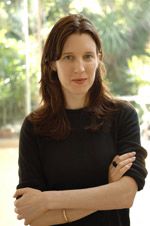
Chloe Hooper won a Walkley (2006) for her writing on Palm Island – and in particular, the death in custody of Cameron Doomadgee and its charged aftermath. Her first non-fiction book,
The Tall Man
is an extended meditation on the case – and a stunning work of reportage, reminiscent of Helen Garner and Truman Capote.
You describe feeling ‘incandescently white’ when you first arrive on Palm Island. Did that feeling recede with time, or was it always with you? How did your awareness of your outsider status affect the way you approached your work?
I was an outsider to Palm Island, but also to the police force, and to the law. The advantage of that was not coming to the story with a set of defined moral or political positions. But I was invited “inside” and I hope the book takes readers there too.
How did you get involved with the Palm Island case in the first place? Had you worked much (or at all) with Aboriginal communities before that?
I’d moved home from overseas a year or so earlier and was keen to know more about Aboriginal Australia. By chance, I met a lawyer, Andrew Boe, who was working pro bono for the Palm Island community. He asked me to come and document the inquest into Cameron’s death. He said it would take two weeks … that was three-and-a-half years ago.
Palm Island is home to one of Australia’s largest Aboriginal communities, and this case seems to incorporate some of the big problems facing Aboriginal Australia: deaths in custody, police attitudes to Aboriginal communities, the underlying tensions of a violent history. What do you see as the most significant issues in this case?
The case definitely highlights all the headlining problems, but actually I wanted to avoid writing about ‘issues.’ I feel strongly that this is a book about people. It’s about the Doomadgee family struggling for justice; and about Hurley, a forceful, complicated policeman. ‘Death in custody’ are three dread words in Australia, but they don’t really penetrate our consciousness. I wanted to write a book about a confronting subject which people would pick up and keep reading, not because they feel they should but because this is a fascinating story.
Queensland’s Fitzgerald Inquiry identified a pervasive code within the police force that required ‘police not enforce the law against other police, nor cooperate in any attempt to do so, and perhaps even obstruct any such attempt’. Do you think this culture influenced the investigation of Chris Hurley?
Well, Hurley was ‘investigated’ by two of his friends, one of whom cooked dinner for the other detectives at Hurley’s house the night Cameron died … Even before Hurley’s trial, police witnesses were threatening members of the prosecution legal team, so you do wonder.
Perspective is a huge factor in the case at the centre of the book – and the book itself. What different people see in the same situation, and how you tease out a ‘truth’ from that. (For example: ‘One man had seen a black drunk, the other a white demon.’) How did you wrestle with this issue in writing the book and observing the case?
I tried as hard as I could to see things from both points of view. Ironically, my last book had been a satire of a true crime novel. Here I was now trying to write one, but the story resisted the genre’s conventions. This book, in some ways, is more like a dot painting: it’s in the little details of people’s lives that the truth lies.
Is it true that you’re interested in true crime as a genre?
True crime is fascinating, because suddenly people’s passions are completely exposed. I think this diverges from the genre, though. The true crime question is ‘did he do it?’. In the end, I hope the reader might ask ‘could I have done it?’
You write that Cameron Doomadgee’s world remained closed to you, as a woman. What kind of challenge did this present in writing the book, to which his story is so integral?
Cameron’s world was closed to the extent that the male world in Aboriginal society is closed off by cultural norms. I got to know Cameron’s loved ones well and I feel I understand to some extent who he was. If you spend a lot of time thinking about someone’s death, you do in a strange way become close to them.
Hurley seems a kind of semi-benevolent Kurtz figure (a parallel you draw) – isolated from higher authority, grown heady with his own power, mistaking the community as his personal fiefdom. How do you think this affected his behaviour on the morning of Cameron Doomadgee’s arrest?
The key question of Keating’s Redfern address is ‘how would I feel if this were done to me?’ I decided if I asked that of the Palm Islanders’ experience, I also had to ask it of Hurley. He was someone who had spent most of his adult life in remote Aboriginal communities and frontier towns—and why he chose to work exclusively there is another issue. But as time went on, I looked at what police in these places regularly deal with, and I did start to wonder how a normal person could not crack up.
Chris Hurley was the first policeman in Australia ever to be charged over the death of a prisoner in custody. Despite the fact that he was not convicted, do you think this represents a significant milestone for Australia’s treatment of Aboriginal people?
Initially Cameron Doomadgee was just another statistic to the powers that be. A lot of hard work by a lot of people has changed that. I am hopeful about the future: I think most Australians want to know about our past and move forward with the business of reconciliation.


